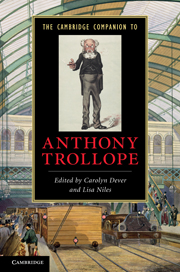Book contents
- Frontmatter
- Introduction
- 1 Trollope’s Literary Life and Times
- 2 Trollope As Autobiographer And Biographer
- 3 Trollope’s Barsetshire Series
- 4 The Palliser Novels
- 5 Trollope Redux: The Later Novels
- 6 Trollope’s Short Fiction
- 7 Trollope And The Sensation Novel
- 8 Queer Trollope
- 9 The hobbledehoy in Trollope
- 10 The construction of masculinities
- 11 Vulgarity and money
- 12 Trollope and the law
- 13 Trollope and travel
- 14 Trollope and the Antipodes
- 15 Trollope and Ireland
- 16 Trollope and America
- Further reading
- Index
- Cambridge Companions to . . .
15 - Trollope and Ireland
Published online by Cambridge University Press: 28 March 2011
- Frontmatter
- Introduction
- 1 Trollope’s Literary Life and Times
- 2 Trollope As Autobiographer And Biographer
- 3 Trollope’s Barsetshire Series
- 4 The Palliser Novels
- 5 Trollope Redux: The Later Novels
- 6 Trollope’s Short Fiction
- 7 Trollope And The Sensation Novel
- 8 Queer Trollope
- 9 The hobbledehoy in Trollope
- 10 The construction of masculinities
- 11 Vulgarity and money
- 12 Trollope and the law
- 13 Trollope and travel
- 14 Trollope and the Antipodes
- 15 Trollope and Ireland
- 16 Trollope and America
- Further reading
- Index
- Cambridge Companions to . . .
Summary
Ireland was the beginning of Trollope, and in many ways it was the end of him. When he accepted a station in Ireland with the postal service in 1841, he was just twenty-six and still certainly what he would later call a “hobbledehoy”: a young man of abstract dreams and unsteady purpose. In Ireland he was recognized for his work and given increasingly wide responsibility. In Ireland he discovered what were to be the abiding fixations of his personal life: writing and hunting. While he had vague thoughts of novel-writing as a young man, Ireland provided both the means and the motive of his first two books, written and set in Ireland and in many ways following in the traditions of Irish fiction. And while he may have thought before of hunting – certainly would have been aware of hunters at Harrow school, as they talked of the sport’s elaborate schedules and expensive kits – his Irish assignment provided the extra income to keep a horse, while the isolation of the Anglo-Irish gentry, resulting from Ireland’s bizarre colonial demographics, seems to have made the social circumstances favorable to him. He made friends hunting, was welcomed in great houses, and thus reversed the agonizing arrangement of his school days, as a local “village boy” who was always made to feel his exclusion.
- Type
- Chapter
- Information
- The Cambridge Companion to Anthony Trollope , pp. 196 - 209Publisher: Cambridge University PressPrint publication year: 2010

